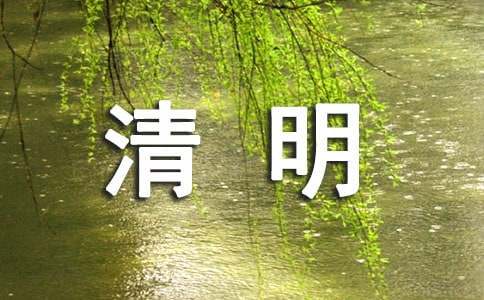- 清明节手抄报英语版 推荐度:
- 相关推荐
2024清明节手抄报英语
在日常学习、工作生活中,许多人对手抄报都不陌生吧,手抄报字行间要整齐,字体不宜太小,忌潦草、错字。那什么样的手抄报才是好的手抄报呢?下面是小编精心整理的2024清明节手抄报英语,希望对大家有所帮助。

清明节英语作文
A well-known poem by Tang Dynasty writer Du Mu tells of a sad scene in early April: "rains fall heavily as Qingming comes, and passers-by with lowered spirits go." Qingming Day, the traditional tomb-sweeping day, falls on April 4-6 each year. It is a time for remembering loved ones who have departed. People visit their ancestors graves to sweep away the dirt.
唐朝著名诗人杜牧有一首著名的诗,描述了四月初令人伤感的一幕场景:“清明时节雨纷纷,路上行人欲断魂。”每年4月4-6日左右的清明节是传统的扫墓的日子。在这一天,人们祭吊去世的亲人,到先人的坟头上扫墓。
Its origin dates back to the Spring and Autumn Period. Jin prince Chonger ran away from the country with his supporters due to persecution. They were homeless for 19 years and things got so bad that Chonger began to starve to death. One of the princes faithful followers, Jie Zitui, cut a piece of muscle from his own leg and served it to his master. Chonger was saved and, in 636 BC, he took back the throne.
清明节可以追溯到春秋时代。晋国公子重耳因受到迫害,率其支持者出逃。19年间,他们居无定所,漂泊四方。一次,他们的处境相当窘迫,重耳饿得快不行了。这时,忠心耿耿的介子推从自己的腿上割下一块肉献给了重耳,公子重耳得救了。公元前636年,他夺回了王位。
He rewarded the officials who had stayed loyal to him but he forgot about Jie Zitui. By the time Chonger remembered him, a heartbroken Jie Zitui had traveled deep into the mountains. Chonger wanted to persuade Jie to come home, so he had the hills set on fire. But Jie was later found beside a large tree, with his old mother on his back. Both were dead.
即位之后,重耳对支持者大加封赏,却忘记了介子推。等到想起这位忠臣时,伤心的介子推早已遁入山林深处。重耳想逼他回来,所以就大火焚山。后来,在一棵大树旁边发现了背着老母的介子推。两人都被烧死了。
Saddened by the tragedy, Chonger ordered that fires could not be lit on the day of Jie Zituis death. From this comes Hanshi Day, or Cold Food Day. People visited Jie Zituis tomb the next day to pay their respects. Over time, Hanshi Day was replaced with tomb-sweeping day.
重耳悲痛欲绝。他下令,在介子推的忌日不准生火。寒食节即来源于此。寒食节的次日,人们到介子推的坟头上致敬。随着时间的推移,寒食节就被清明节所取代。
清明节的起源
Qingming Festival, also known as Pure Brightness Festival or Tomb-sweeping Day, is one of the 24 segments of the Chinese calendar. It normally falls on the 4th or 5th of April, between spring plowing and summer weeding, and is a time to pay respects to ones ancestors and to tidy their gravesite. On this day, whole families, young and old, go to the gravesite of deceased family members to burn incense and perform a ritual offering while clearing away plant overgrowth from the gravesite.
Qingming Festival is when Chinese people visit the graves or burial grounds of their ancestors. Traditionally, people brought a whole rooster with them to the graves visited but the occasion has become less formal over time. The festival originated from Hanshi Day (寒食节, literally, Day with cold food only), a memorial day for Jie Zitui (介子推). Jie Zitui died in 636 BC in the Spring and Autumn Period. He was one of many followers of Duke Wen of Jin before he became a duke.
Once, during Wens 19 years of exile, they had no food and Jie prepared some meat soup for Wen. Wen enjoyed it a lot and wondered where Jie had obtained the soup. It turned out Jie had cut a piece of meat from his own thigh to make the soup. Wen was so moved he promised to reward him one day. However, Jie was not the type of person who sought rewards. Instead, he just wanted to help Wen to return to Jin to become king. Once Wen became duke, Jie resigned and stayed away from him. Duke Wen rewarded the people who helped him in the decades, but for some reason he forgot to reward Jie, who by then had moved into the forest with his mother. Duke Wen went to the forest, but could not find Jie. Heeding suggestions from his officials, Duke Wen ordered men to set the forest on fire to force out Jie.
However, Jie died in the fire. Feeling remorseful, Duke Wen ordered three days without fire to honour Jies memory. The county where Jie died is still called Jiexiu (介休, literally "the place Jie rests forever").
清明节的习俗
清明节的习俗是丰富有趣的,除了讲究禁火、扫墓,还有踏青、荡秋千、蹴鞠、打马球、插 柳等一系列风俗体育活动。相传这是因为清明节要寒食禁火,为了防止寒食冷餐伤身,所以大家来参加一些体育活动,以锻炼身体。因此,这个节日中既有祭扫新坟 生别死离的悲酸泪,又有踏青游玩的欢笑声,是一个富有特色的节日。
The custom of the qingming festival is richinteresting, in addition to pay attention to the fire, the grave, and outing,swing, a game called cuju, play polo, ed liu and so on a series ofcustoms sports activities. This is because tomb-sweeping day to people from thefire, in order to prevent a cold buffet injury body, so everyone to take partin some of the sports activities, and to exercise. Therefore, this festivalboth JiSao new born from the grave dont dead BeiSuan tears, and visit outinglaughter, is a rich characteristic holiday.
但是,清明作为节日,与纯粹的节气又有所不同。节气是我国物候变化、时令顺序的标志,而节日则包含着一定的风俗活动和某种纪念意义。
But, as a clear festival, and pure solar termand different. Solar term is our country phenology, seasonal change of theorder of symbol, and the festival is contains certain custom of commemoration.
清明节是我国传统节日,也是最重要的祭祀节日,是祭祖和扫墓的日子。扫墓俗称上坟,祭祀死者的一种活动。汉族和一些少数民族大多都是在清明节扫墓。
Ching Ming festival is a traditionalChinese festival, is also the most important sacrifice holiday, is the day ofworship their ancestors and the grave. The grave commonly known as ShangFen,the sacrifices of the dead an activity. The han nationality and some minorityare mostly in the ching Ming festival the grave.
按照旧的习俗,扫墓时,人们要携带酒食果品、纸钱等物品到墓地,将食物供祭在亲人墓前,再将纸钱焚化,为坟墓培上新土,折几枝嫩绿的新枝插在坟上,然后叩头 行礼祭拜,最后吃掉酒食回家。唐代诗人杜牧的诗《清明》:“清明时节雨纷纷,路上行人欲断魂。借问酒家何处有?牧童遥指杏花村。”写出了清明节的特殊气 氛。
According to the old tradition, the grave,people to carry goods such as especially fruit, paper money to the cemetery,will be food for offering in the tomb of loved ones, then the deadincineration, grave earthed up new soil, fold a few branches of the 60-footgreen ed in a grave, and then KouTou worship salute, finally eatespecially home. The poets in tang dynasty DuMu poem painting :time.though rain in succession, pedestrian rains fall heavily as qingmingcomes JieWen restaurant where you have. The most ambitious almond flowers?Village. Write the tomb-sweeping day special atmosphere.
【清明节手抄报英语】相关文章:
清明节手抄报英语版06-10
英语手抄报07-11
手抄报清明节07-02
清明节手抄报「精选」06-06
温馨清明节手抄报12-16
趣味的清明节手抄报12-16
又是清明节手抄报12-16
传统清明节的手抄报12-16
趣味清明节手抄报12-16